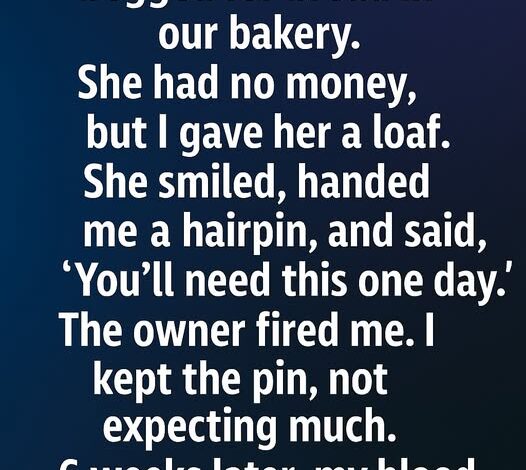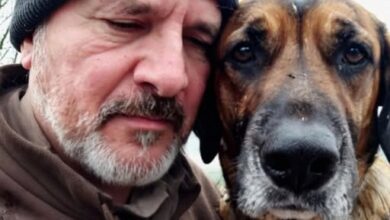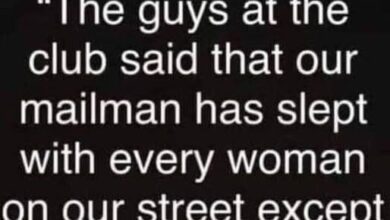
A Gift Returned! The Power of Compassion
It was just another gray morning at the bakery—slow hours, empty shelves, and the hum of the old refrigerator filling the silence. I was wiping down the counter when the bell above the door chimed softly. A woman stood there, her coat too thin for the weather, one hand resting on her swollen belly. Her eyes were tired but kind, carrying that desperate humility of someone who’s been told “no” too many times.
“I’m sorry,” she said, voice trembling, “but could I please have a loaf of bread? I don’t have money right now. I’m pregnant, and I just need something to eat.”
For a moment, I froze. We weren’t supposed to hand out food without payment—strict rule. The owner had made that clear: No freebies, no exceptions. But looking at her, all I could see was a human being in need. I wrapped a loaf, handed it to her quietly, and whispered, “Take it. Don’t worry about it.”
Her face softened with relief, and she smiled—a small, grateful smile that somehow felt enormous. Before she left, she reached into her hair and pulled out a tiny silver hairpin. “You’ll need this one day,” she said, pressing it into my palm. It was such an odd gesture, I almost laughed. I didn’t need a hairpin. But I kept it anyway.
An hour later, the owner found out. He didn’t shout. He just stared at me, cold and disappointed. “We’re running a business, not a charity,” he said, and handed me my final paycheck. Just like that, I was out.
Six weeks went by. Job hunting became its own kind of humiliation—applications ignored, polite rejections, and the slow bleed of hope that comes with waiting for a call that never comes. Every time I reached into my jacket pocket, I felt that hairpin. Some nights, I thought about throwing it away. But something about it—maybe the strange certainty in that woman’s eyes—stopped me.
One evening, I was walking home in the rain, shoes soaked through, stomach empty, when I passed a café. Warm light spilled from the windows. The smell of coffee and sugar hit me like a memory. There was a small sign taped to the glass: HELP WANTED.
I almost kept walking. But something inside me said try one more time.
The manager, a middle-aged woman with streaks of gray in her hair, looked up when I stepped in. I told her I was looking for work. She asked for experience, and I told her about the bakery—the hours, the kneading, the customers, the day I was fired. I don’t know why I mentioned that last part. Maybe I was too tired to filter anything.
When I said it, her face changed. Her eyes softened, the same way the pregnant woman’s had. She asked which bakery. When I told her, she sighed quietly. “I know that place,” she said. “I used to go there. It lost something when kindness walked out the door.”
Then she smiled. “We value hearts here, not just hands.” She hired me on the spot.
The café was everything the bakery wasn’t—warm, welcoming, alive. The people laughed easily. Customers were greeted by name. We left little notes on coffee cups—small things that meant something. For the first time in months, I didn’t feel like I was fighting the world alone.
Weeks passed, and I started to feel like I belonged. I carried that hairpin in my apron pocket every day, a quiet reminder that doing the right thing, even when it costs you, still matters.
One morning, while wiping down tables, I overheard two regulars talking near the window. They mentioned a local charity that had been helping struggling families get back on their feet. One of the names caught my ear—it was hers. The pregnant woman. She’d found shelter, medical help, and a small job through the charity’s network.
I stood there, frozen, my heart pounding. It was like the universe had whispered, see? kindness comes back.
About a month later, an envelope appeared on the counter with my name scrawled in uneven handwriting. Inside was a note and a small café gift card.
“Your kindness helped me stand. Now it’s my turn. —M.”
There was also a folded piece of paper tucked behind it. It was a copy of a thank-you letter she’d written to the charity, talking about the stranger at the bakery who’d given her bread when she had nothing. She said that moment reminded her that the world could still be kind—and that it gave her the strength to ask for help.
At the bottom of the note was one last line: “Kindness travels. Sometimes it just takes the long way home.”
I read it three times, feeling that same strange pull I’d felt when she gave me the hairpin. That tiny, silly thing suddenly meant more than I could explain. It wasn’t about luck—it was a thread, tying one act of compassion to another, looping back in ways none of us could predict.
I kept working at the café, and eventually, the manager told me she wanted me to help train new hires. “You understand people,” she said. “That’s rare.”
Every now and then, someone would come in looking lost, hungry, or just defeated by life. And I’d remember that day at the bakery—the choice that cost me a job but gave me something far more valuable: the proof that compassion, even in the smallest act, changes things.
Kindness doesn’t always pay back in money or success. Sometimes it comes back as an opportunity when you’re at your lowest, or as a note in an envelope that reminds you you’re part of something bigger than yourself.
I still keep that hairpin, though not as a charm. It’s bent and worn now, but I carry it like a promise—a reminder that even when the world tells you to harden, it’s better to stay soft. Because the moment you stop choosing kindness, you stop believing in what connects us all.
And in the quiet hours before dawn, when I unlock the café and the smell of fresh coffee fills the air, I sometimes imagine that woman walking by with her child, both of them safe, both of them fed. Maybe she remembers that day. Maybe she doesn’t. But I know I do.
Because sometimes, all it takes is a loaf of bread, a bit of faith, and the courage to be kind when it’s inconvenient. And that, I’ve learned, can be the start of a story that keeps on giving—long after the bread is gone.




